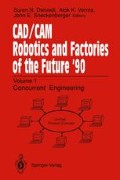Abstract
Algorithms using analytic methods for the group technology problem of machine part family formation are relatively slow considering the typical large size of the machine-part matrix. In this study, a neural network approach that uses the Adaptive Resonance Theory (ART) paradigm to classify vectors obtained from the machine-part matrix, is proposed. The effect of varying the sensitivity of the ART in recognizing the similarity between the vectors and preprocessing of these vectors, on the formation of part groups is discussed. Initial test results obtained from the neural network application are compared with those of existing cell formation algorithms.
Access this chapter
Tax calculation will be finalised at checkout
Purchases are for personal use only
Preview
Unable to display preview. Download preview PDF.
References
Dagli, Cihan H.; Lammers, Scott; Vellanki, Mahesh. Intelligent Scheduling in Manufacturing through Neural Networks and Expert Systems, (to appear in Journal of Neural Network Computing 1991 ).
Hyer, Nancy L.; Wemmerlov, Urban: Group Technology in the US manufacturing industry: A survey of current practices. International Journal of Production Research. Vol. 27. 1989. 1287–1304.
Hyer, Nancy L.: Group Technology at Work. Society of Manufacturing Engineers. 1984. First Edition.
King, J.R.; Nakornchai, V. Machine-component group formation in group technology: review and extension. International Journal of Production Research. 1982. Vol. 20. No. 2. 117–133.
Seifoddini, Hamid: A note on the similarity coefficient method and the problem of improper machine assignment in group technology application. International Journal of Production Research. 1989. Vol 27. No. 7. 1161–1165.
Wei, Jerry C.; Gaither, Norman: An Optimal Model for Cell Formation Decisions. Decision Sciences. 1990. Vol. 21. No. 2. 416–433.
Wasserman, Philip D.: Neural Computing - Theory and Practice. Van Nostrand Reinhold. 1989.
Carpenter, Gail A.: Neural Network Models for Pattern Recognition and Associative Memory. Neural Networks. 1989. Vol. 2. 243–257.
Moon, Young: An Interactive Activation and Competition Model for Machine-Part Family Formation in Group Technology. International Joint Conference on Neural Networks–Washington D.C. 1990. Vol II. 667–670.
Kusiak, Andrew: Knowledge-Based Group Technology. Expert Systems. Society of Manufacturing Engineering. 1988. 259–299.
Author information
Authors and Affiliations
Editor information
Editors and Affiliations
Rights and permissions
Copyright information
© 1991 Springer-Verlag Berlin Heidelberg
About this paper
Cite this paper
Huggahalli, R., Dagli, C. (1991). Machine-Part Family Formation Using Neural Networks. In: Dwivedi, S.N., Verma, A.K., Sneckenberger, J.E. (eds) CAD/CAM Robotics and Factories of the Future ’90. Springer, Berlin, Heidelberg. https://doi.org/10.1007/978-3-642-84338-9_13
Download citation
DOI: https://doi.org/10.1007/978-3-642-84338-9_13
Publisher Name: Springer, Berlin, Heidelberg
Print ISBN: 978-3-642-84340-2
Online ISBN: 978-3-642-84338-9
eBook Packages: Springer Book Archive

